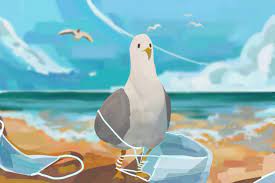A Serious Conversation: Cutting the Strings on your Face Mask

September 14, 2021
Since the start of the spread of COVID-19 in March 2020, civilians have been ordered to wear a face covering in public. These face coverings or “masks” have come in many forms: fabric, used bandannas, plastic face shields, and, of course, the disposable model. It has been encouraged that everyone buys a reusable, fabric face mask that can be washed and reused for a long time. Although this has been suggested, more than half of our student body alone chooses to wear a disposable face mask. Not only is a heap of disposable masks bad for the environment, but the strings attached to them are a whole new problem.
The huge increase in mask sales has led to a mass increase in plastic pollution. People only started to realize this issue once media reports panned around the French Riviera waters, showing pictures and videos of divers picking up masks and gloves near the shore. If historical data is used as a reliable indicator, it is predicted that 75% of disposable face masks will be found in landfills or floating in seas. Because of this, fishing and tourism industries are down $40 million.
While face masks in general will always be material of plastic pollution, many animal rights activists suggest that the community should cut the strings off of their face masks before disposing of the product. Yes, the separate products of string and cloth are still plastic waste, but this operation helps many marine species in and around water sources. Animal rights activists and beach clean-up volunteers have found seagull’s feet wrapped and tangled in disposable face masks, while others have witnessed a gull carrying one around in its beak.
The Impact:
As the author, I hope that this article and the series I plan to write gives at least a small impact on the reader. COVID-19 has made a small scar on each one of our shoulders, but we have to remember that the scars appear on animal’s shoulders too. Plastic Pollution has always affected birds, even before the mass production of the disposable mask. The next time you throw away your mask, take 30 seconds to find a pair of scissors and cut the ear pieces off–or maybe it’s time to find a reusable one.
Crisis Resources:
1+(888)-378-2525 : Alaska Sealife Center Rescue line
1+(800)-424-8802 : Report and oil or chemical spill
Resources:
https://www.youtube.com/watch?v=_MUzNuksV1Y
https://inews.co.uk/news/face-masks-snip-straps-rspca-hurting-animals-tangled-reusable-644226
https://www.indiatimes.com/trending/environment/images-covid-waste-hurting-animals-520790.html
https://www.greenmatters.com/p/face-masks-wildlife




